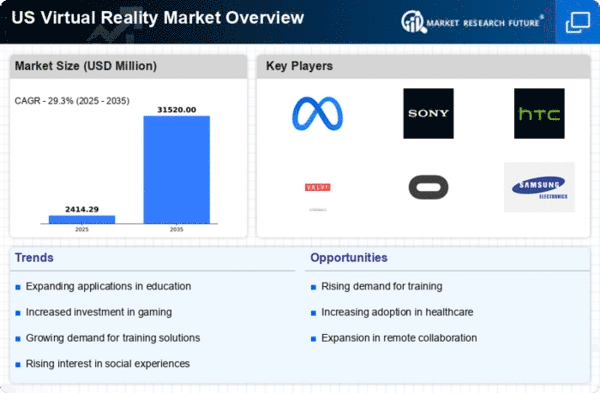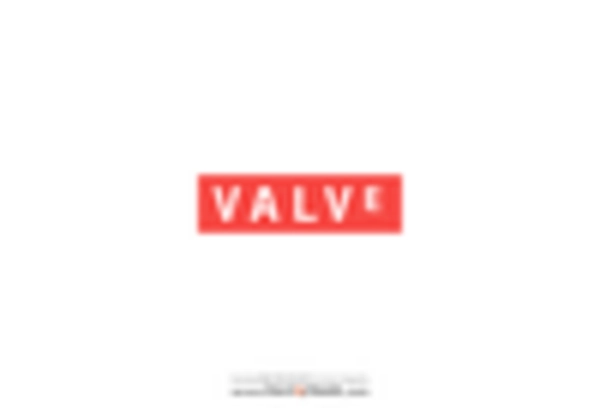Increased Investment in VR Startups
The virtual reality market is witnessing a surge in investment in startups focused on VR technologies and applications. Venture capitalists and tech companies are increasingly recognizing the potential of VR to disrupt various industries, leading to a wave of funding for innovative projects. In 2025, it is estimated that investment in VR startups will exceed $5 billion, reflecting a growing confidence in the market's future. This influx of capital is likely to accelerate the development of new VR applications, further driving market growth. As a result, the virtual reality market is positioned to benefit from a dynamic ecosystem of innovation and entrepreneurship, which could lead to groundbreaking advancements in the technology.
Technological Advancements in Hardware
The virtual reality market is experiencing a surge in demand due to rapid advancements in hardware technology. Innovations in graphics processing units (GPUs) and display technologies are enhancing the immersive experience, making VR more appealing to consumers. For instance, the introduction of high-resolution displays and improved motion tracking systems has led to a more realistic and engaging user experience. As of 2025, the market for VR hardware is projected to reach approximately $15 billion, indicating a robust growth trajectory. This growth is further fueled by the increasing availability of affordable VR headsets, which are making the technology accessible to a broader audience. Consequently, the virtual reality market is poised for significant expansion as these technological improvements continue to evolve.
Integration with Social Media Platforms
The virtual reality market is increasingly integrating with social media platforms, creating new avenues for user engagement and content sharing. This integration allows users to share their VR experiences in real-time, fostering a sense of community and collaboration. As social media continues to evolve, the demand for immersive content is likely to rise, driving further adoption of VR technologies. In 2025, it is estimated that around 40% of VR users will engage with social media through VR applications, highlighting the potential for growth in this area. This trend suggests that the virtual reality market could become a pivotal player in the social media landscape, offering unique experiences that traditional platforms cannot replicate.
Expansion of VR in Retail and E-commerce
The virtual reality market is expanding into the retail and e-commerce sectors, providing innovative shopping experiences that enhance customer engagement. Retailers are utilizing VR to create virtual showrooms, allowing customers to explore products in a 3D environment before making a purchase. This immersive shopping experience can lead to increased conversion rates and customer satisfaction. As of 2025, it is projected that VR applications in retail will contribute to a market growth of approximately 20%, as more businesses recognize the value of offering unique shopping experiences. This trend indicates that the virtual reality market is likely to play a crucial role in the future of retail, transforming how consumers interact with brands.
Rising Demand in Training and Simulation
This market is witnessing a notable increase in demand for training and simulation applications across various industries. Sectors such as aviation, military, and manufacturing are leveraging VR to create realistic training environments that enhance skill acquisition and retention. For example, VR training programs can reduce training costs by up to 30% while improving safety and efficiency. The ability to simulate complex scenarios without real-world risks is particularly appealing to organizations. As of 2025, the market for VR training solutions is expected to grow by approximately 25%, reflecting the increasing recognition of VR's effectiveness in professional development. This trend underscores the potential of the virtual reality market to transform traditional training methodologies.
















